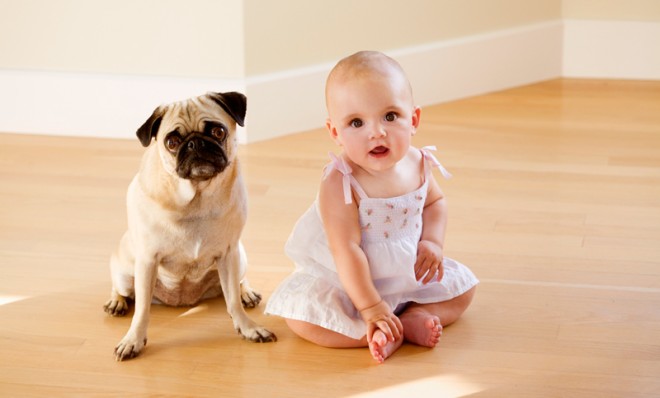What science says your dog and baby have in common
It's not just that they're both adorable

A free daily email with the biggest news stories of the day – and the best features from TheWeek.com
You are now subscribed
Your newsletter sign-up was successful
If you're the kind of dog owner who doesn't see anything wrong with pampering a pooch as if it were your own child, here's some good news: A new study published in the journal PLoS One has found that canines and human babies are eerily similar in the way they're dependent on human adults.
First, a bit of history: The first domestic dogs are believed to have begun following our ancestors around somewhere between 15,000 to 33,000 years ago, though the exact "why" is still a matter of contention. Some believe that humans domesticated early wolves they found poking around in the village outskirts for leftover food. Other experts theorize that canines developed a symbiotic relationship with our hunter-gatherer ancestors much earlier on, swooping in for easy scraps left over from big, meaty kills.
In this new study, researcher Lisa Horn of the University of Veterinary Medicine, Vienna, sought to examine just how dependent dogs are on their human caregivers. To do so, she and her team observed a group of test dogs, who could win food rewards by interacting with certain dog toys, in three different conditions: While the owner was absent; while the owner was present but silent; and while the owner was encouraging the dog. Researchers found that whenever the owner wasn't in the picture, the dogs was far less interested in working for treats.
The Week
Escape your echo chamber. Get the facts behind the news, plus analysis from multiple perspectives.

Sign up for The Week's Free Newsletters
From our morning news briefing to a weekly Good News Newsletter, get the best of The Week delivered directly to your inbox.
From our morning news briefing to a weekly Good News Newsletter, get the best of The Week delivered directly to your inbox.
Then the experiment was repeated, only with a stranger in place of the dog's owner. Researchers were surprised when the dogs were largely indifferent to another human's warmth and encouragement, even when tasty snacks were used as motivation.
Horn and her team call this the "secure base effect." Originally pioneered by psychologist John Bowlby, it is described as a "lasting psychological connectedness between human beings" (1969). Infants are dependent on their parents for food, shelter, and love, which creates a "secure base" for them as they explore an unfamiliar world.
The same is apparently true for dogs. They look specifically to their specific humans — not some snack-wielding imposter — for a sturdy base in unfamiliar surroundings. "The study provides the first evidence for the similarity between the 'secure base effect' found in dog-owner and child-caregiver relationships," says Horn. "It will be really interesting to try to find out how this behavior evolved in the dogs with direct comparisons."
In other words, go ahead and pamper away.
A free daily email with the biggest news stories of the day – and the best features from TheWeek.com
-
 The environmental cost of GLP-1s
The environmental cost of GLP-1sThe explainer Producing the drugs is a dirty process
-
 Nuuk becomes ground zero for Greenland’s diplomatic straits
Nuuk becomes ground zero for Greenland’s diplomatic straitsIN THE SPOTLIGHT A flurry of new consular activity in Nuuk shows how important Greenland has become to Europeans’ anxiety about American imperialism
-
 ‘This is something that happens all too often’
‘This is something that happens all too often’Instant Opinion Opinion, comment and editorials of the day